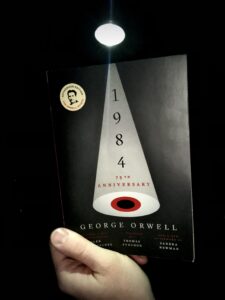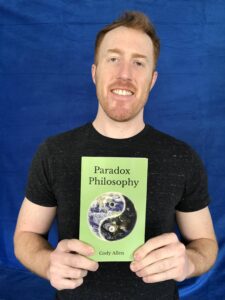 This prophetic novel was published in 1949, imagining a future society (only 35 years in the future when it was published) that is under the thumb of a totalitarian government. It is a world where no individual freedoms are allowed and everyone is monitored all the time by advanced technology. If the ruling Party suspects an individual of treason, they are ‘vaporized’ and not only disappear, the records are permanently changed to make it as though they never existed. The Party figurehead is a man named Big Brother (possibly real, possibly imaginary) whose image is posted everywhere and who is always watching. Life is dismal and grim and contains no hope of a brighter future.
This prophetic novel was published in 1949, imagining a future society (only 35 years in the future when it was published) that is under the thumb of a totalitarian government. It is a world where no individual freedoms are allowed and everyone is monitored all the time by advanced technology. If the ruling Party suspects an individual of treason, they are ‘vaporized’ and not only disappear, the records are permanently changed to make it as though they never existed. The Party figurehead is a man named Big Brother (possibly real, possibly imaginary) whose image is posted everywhere and who is always watching. Life is dismal and grim and contains no hope of a brighter future.
Our protagonist is a member of the Outer Party (as opposed to the more superior Inner Party), a simple administrator named Winston Smith whose job is to rewrite the past so as to always cast the Party in a positive light. If a newspaper article from last year references a war with Eurasia, but the Party is currently at war with Eastasia, Winston rewrites the article and changes history to reflect the new reality: the war has always been with Eastasia and never different. This allows the Party to maintain their monopoly on ‘truth.’ This is also one of the main ways the Party is able to keep control: by controlling the past. In the book, there are several times where characters talk about how controlling the present allows the Party to control the past, and controlling the past is how they control the future. Winston isn’t even sure if it is in fact 1984, all he knows is what the Party allows him to.
As we get to know Winston, we see him trying to battle his own rebellious thoughts, lest he be arrested for ‘thoughtcrime.’ Eventually he breaks, writing the words Down With Big Brother in his journal, the catalyst for his journey to freedom. What transpires afterwards is an affair with a young woman named Julia, also a secret rebel, and their journey to join other revolutionaries. Love is forbidden in their world and they risk severe punishment for even the small act of holding eye contact too long. Eventually they are caught, tortured, and turned into shells of their former selves by the Party.
At its core, this book is an exploration of how fear and hate fuel a society of oppression. Everyone is scared of one another, for who knows who might work for the Party? Coworkers are scared of each other, as are husbands and wives, and even parents are scared of their children who are educated by the state and known to report suspicious behavior inside the household. Anyone could be an agent for the Thought Police; anyone could be an enemy. The country is perpetually at war, and the people are taught to hate their enemies. Every day, all party members are made to participate in a ritual called the ‘Two Minutes Hate’ during which they are shown films of their enemies and expected to loudly voice their hatred for them. Through both fear and hate, the Party is able to dehumanize others, and therefore keep control.
The message is clear: fear and hate will take us to a dark and dismal place, one that we certainly don’t want to go to. This book, and its author, is the reason why we call the future ‘Orwellian’ when our government behaves in authoritarian ways. Things have become especially scary with the recent and rapid advancements in technology and artificial intelligence and the government’s desire to control them. The solution is to continue to stay connected to one another and our shared humanity. We must continue to stoke hope for a better future, and we must find love in our hearts for all the other people we share this world with.


